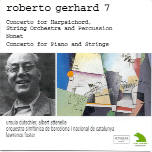The recent upsurge in interest in Roberto Gerhard’s music on disc must warm the heart of every lover of this great modern composer. The virtues of the two competing series of recordings, one on Chandos, the other on Auvidis Montaigne, at times have been complimentary. While generally excellent, the Chandos series has not as yet given any attention to the larger chamber works such as the Nonet, and its recording of the Harpsichord Concerto was its one spectacular failure to date. Gerhard’s music is exceptionally difficult to perform, and his aural imagination was so sensitive and that an idiomatic reproduction of the detailed indications in his scores requires very extensive preparation. The Harpsichord Concerto demands hair-trigger reflexes from the soloist, and also requires the most delicately sensitive of accompaniments. When it gets them, as here, the results are magical, an evocative tapestry of sound that mingles the night music of Bartók with memories of the Spanish Romantic Nationalists as seen through the expressionism of the Second Viennese School.
And through it all, there is that exquisite formal control and emotional urgency of utterance that is uniquely Gerhard. Sure, it’s “difficult” music, but so very, very complete, and thus so satisfying to anyone willing to give it the time it deserves. The Nonet, another late masterpiece scored for the unusual combination of wind quintet plus trumpet, trombone, tuba, and accordion, brilliantly displays Gerhard’s ability to take an apparently disparate collection of instruments and create from them a veritable sonic cosmos. Finally, the transitional Concerto for Piano and Strings predates Gerhard’s late masterpieces, and shows his debt to Bartók most clearly. As with the Harpsichord Concerto, these performances all do the music proud, and anyone who cares about the best contemporary music really should hear them.
































